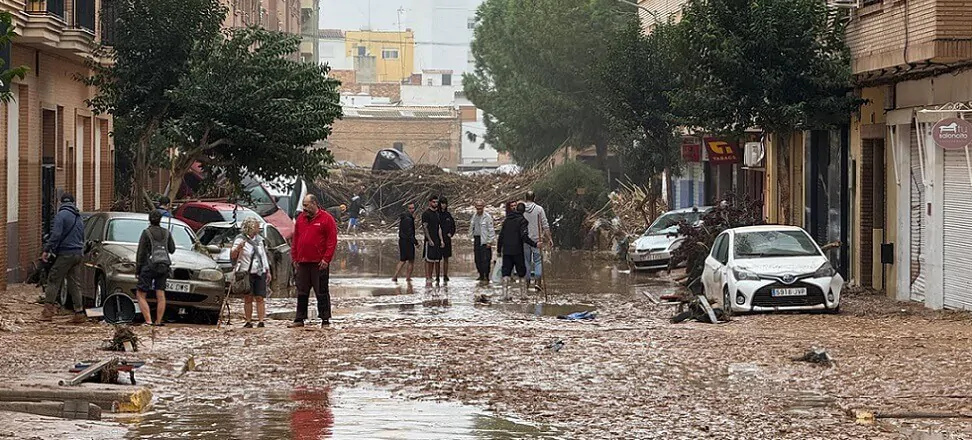News, Issue 20/2024
Dramatic floods in Spain – causes, consequences, and those responsible for the catastrophe
An unprecedented catastrophe – this is how global media describe the floods in Spain, which in the past week alone have claimed the lives of at least 217 people. The enormous losses and chaos prevailing in the southern part of the country raise numerous questions about the causes of the disaster and responsibility for its course. In the town of Paiporta in the Valencia region, distraught and desperate residents threw mud at King Felipe VI during his visit on Sunday.
The largest natural disaster
The October floods in Spain quickly transformed into the largest national catastrophe in the country’s recent history and the deadliest flood in Europe in the last quarter-century. The immediate cause was a typical autumn atmospheric phenomenon for the western Mediterranean known as DANA. Torrential rains – amounting to as much as 490 mm of water per square meter within eight hours – led to the flooding of the Valencia region, where at least 213 people perished in the flood wave. Additional victims were found in the province of Albacete, in the Castile-La Mancha region. Five thousand soldiers are still searching the areas affected by the disaster for the missing.
In Valencia, where rain is still expected, schools remain closed, and road traffic is seriously restricted. On Monday morning, kilometers of traffic jams formed on roads and highways. The army is transporting water, food, and essential supplies by trucks and helicopters to residents most affected by the tragedy. Streets and underground parking lots are flooded, and municipal infrastructure has suffered severe damage. The Spanish Ministry of Defense’s X profile continuously updates with reports of the painstaking process of uncovering cities buried in mud.
El Escuadrón de Apoyo al Despliegue Aéreo #EADA @EjercitoAire continúa desarrollando acciones de limpieza y apoyo donde es necesario, en este caso, en Catarroja. pic.twitter.com/8MMg0zfLvy
— Ministerio Defensa (@Defensagob) November 4, 2024
Climate change as a cause?
Ernesto Rodríguez Camino from the Spanish Meteorological Society, in a statement to the British Guardian, made it clear that natural disasters are becoming visibly more frequent and intense. The World Meteorological Organization (WMO), referring to the floods in Spain, stated that extreme weather events will become more common as the hydrological cycle has been disrupted. Climate change, in particular, fuels local phenomena such as DANA, where increasingly warm air masses over the Mediterranean play a dominant role. Every 1-degree rise in global warming means an additional 7% of water vapor in the air!
This year’s torrential rain could not, of course, have been avoided. Critics, however, point out that assistance arrived too late and was poorly distributed. The first military reinforcements focused only on three towns, while firefighters were the only responders in other cities. Residents were left without food, water, and electricity, and looters and thieves took to the streets. Due to poor organization, two helicopters flying in to help from Andalusia were turned back, and many volunteers and firefighters from other regions could not take action. It is hardly surprising that the regional government faces mounting criticism.
Floods in Spain and the warning system
Sunday’s riots in towns within the Valencia region, visited by the royal couple and the Spanish Prime Minister, triggered a wave of public accusations. Residents of flooded municipalities claim they were not warned in time, leading to unnecessary loss of life. Sharp words emerged, such as “murderers.”
The Spanish Ministry of Internal Affairs and Civil Protection (INUNCAT) sends warnings to the mobile phones of residents in regions most threatened by heavy rainfall. The Aemet meteorological agency also issues risk warnings. This time, however, alerts only reached people on Tuesday evening, when water was already on the streets and most citizens were returning from work or shopping. Panic erupted, and for many, it was too late for rescue.
According to WMO representative Clare Nullis, timely warnings are critical to avoiding losses on the scale observed in Valencia. Additionally, people need to know how to respond quickly to such signals. She believes it is the Spanish authorities’ duty to analyze the events of recent days and the oversights associated with them. This assessment was supported by Hannah Cloke, a hydrology professor at the University of Reading in the UK, who stated: “The warning system in Valencia failed with fatal consequences.” She also added that it is high time to tighten flood alarms – from often-ignored mobile notifications to loud sirens.









